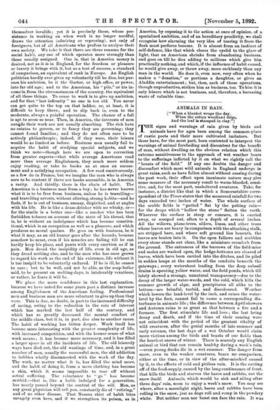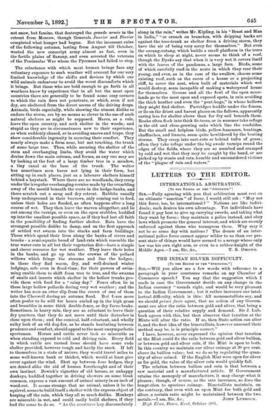ANIMALS IN RAIN.
[" When a blanket wraps the day, When the rotten woodland drips, And the leaf is stamped in clay."] THE signs and warnings of rain given by birds and animals have for ages been among the common-place of rustic poets and their more cultivated imitators. But these have, for the most part, been contented to interpret the warnings of animal foreboding and discontent for the benefit of man, without dwelling on the obvious relation which this extreme sensitiveness to the approach of wet weather bears to the sufferings inflicted by it on what we rightly call the "beasts of the field." If any one doubts the danger and discomfort which most wild animals in England undergo in great rains, such as have fallen almost without ceasing during the past week, their effect upon inanimate nature may give some measure of the necessary result to warm-blooded, sensi- tive, and, for the most part, unsheltered creatures. Take, for instance, a district like that in which a Somersetshire corre- spondent of the Times states that the measured rainfall for two days exceeded two inches of water. The whole surface of the arable fields is " patted " flat by the pelting rain— for the drops which "hollow the stone" flatten the earth. Wherever the surface is steep or concave, it is carried away, or scooped out, often to a depth of several inches. All the willows, plane-trees, alders, limes, and other trees whose leaves are heavy in comparison with the attaching stalk, are stripped bare, and where soft ground lies beneath, the leaves are beaten into it. On the open fellows and stabbles every stone stands out clear, like a miniature cromlech from the ground. The entrances of the burrows of the field-mice and moles are washed open, the hedge-bottoms are cleared of leaves, which have been carried into the ditches, and lie piled in sodden heaps at the mouths of the conduits beneath the gateways ; every watershoot leading from the deep subsoil drains is spouting yellow water, and the field ponds, which till lately showed a strange, unnatural transparency—due to the decay of the larger water-weeds, and the cold, which kills the summer growth of algae, and precipitates all alike to the bottom—are brimful, turbid, and discoloured. Weather which lowers the land-level by the inch, and raises the water- level by the foot, cannot fail to cause a corresponding dis- turbance in animate life ; the difference between April showers and Autumn rains is as great as that between a fire and a furnace. The first stimulate life and love ; the last bring decay and death, and if the time of their coming were not coincident with the period of the greatest vitality of wild creatures, after the genial months of late summer and early autumn, the last days of a wet October would claim more victims among the birds and beasts of our fields than the heaviest snows of winter. There is scarcely any English animal or bird that can remain healthy during a week's rain, —even young ducks die in a wet summer. The danger from snow, even to the weaker creatures, bears no comparison, either at the time, or in view of the after-mischief caused by it, to the effects of cold and pitiless rain. It is the cutting off of the food-supply, caused by the long continuance of frost, that kills the birds and starves the hares and rabbits, not the snow itself. Animals, which would be sick and ailing after three days' rain, seem to enjoy a week's snow. You may see where, after a moonlight night, hares and rabbits have been rolling in the snow, just as dogs roll and romp in the powdery white. But neither man nor beast can face the rain. It was not snow, but famine, that destroyed the grande armee in the retreat from Moscow, though Generals .Tanvier and Fevrier completed what hunger had begun. But the incessant rains of the following autumn, lasting from August till October, wasted the new conscript army almost as fast, even in the fertile plains of Saxony, and even arrested the veterans of the Peninsular War whom the Pyrenees had failed to stop.
The reluctance with which most human beings face any voluntary exposure to such weather will account for our very limited knowledge of the shifts and devices by which our wild animals endeavour to avoid the worst discomforts which it brings. But those who are bold enough to go forth in all weathers know by experience that in all but the most open countries there are generally to be found some cosy corners to which the rain does not penetrate, or which, even if not dry, are sheltered from the direct access of the driving drops. Animals, birds especially, while showing the utmost dislike to endure the storm, are by no means so clever in the use of such natural shelters as might be supposed. Hares, as a rule, leave the open country, and seek shelter in the woods; and stupid as they are in circumstances new to their experience, as when suddenly chased, or in avoiding snares and traps, they show considerable ingenuity in securing their comfort. They nearly always make a form near, but not touching, the trunk of some large tree. Thus, while securing the shelter of the stem and overhanging limbs, they avoid the water which drains down the main column, and forms, as any one may see by looking at the foot of a large timber tree in a meadow, a tiny canal at the base of the trunk. The writer has sometimes seen hares not lying in their form, but sitting up in such places, just as a labourer shelters himself behind a haystack. Where there are no woodlands, they creep under the irregular overhanging cornice made by the crumbling away of the mould beneath the roots in the hedge-banks, and there scratch out a snug and dry retreat. Rabbits usually keep underground in their burrows, only coming out to feed, unless their holes are flooded, as often happens after a long course of wet. They then leave the warren altogether, and lie out among the turnips, or even on the open stubbles, huddled up into the smallest possible space, as if they had lost all faith in the possibility of finding farther shelter. Rats have the strongest possible dislike to damp, and on the first approach of settled wet swarm into the stacks and farm buildings. Those which spend their lives along the banks of rivers and brooks - a semi-aquatic breed of land-rats which resemble the true water-rats in all but their vegetarian diet—have a simple and clever resource for wet weather. They leave their holes in the banks, and go up into the crowns of the pollard willows which fringe the streams and line the hedges; in these they find warm, dry, and well-drained winter lodgings, safe even in flood-time; for their powers of swim- ming enable them to shift from tree to tree, and the swarms of snails and insects which shelter in the hollow trunks pro- vide them with food for a "rainy day." Foxes often lie in these large hollow pollards during very wet weather ; and the writer has seen an otter slip from the crown of one of them into the Cherwell daring an autumn flood. But foxes more often prefer to lie still for hours curled up in the high grass and brambles in some thick double-fence, or dry furze-brake. Sometimes, in heavy rain, they are so reluctant to leave their dry quarters, that they do not move until their disturber is close upon them ; and the comical, half-reluctant, and wholly sulky look of an old dog-fox, as he stands hesitating between prudence and comfort, should appeal to the most unsympathetic sportsman. Horses and cattle never look so miserable as when standing exposed to cold and driving rain. Every field in which cattle are turned loose should have some rude shelter provided, however rough and hardy the stock. If left to themselves in a state of nature, they would travel miles to some well-known bank or thicket, which would at least give cover against the wind. Shut up between four hedges, they are denied alike the aid of human forethought and of their own instinct. Bewick's vignettes of old horses, or unhappy donkeys, huddled together in driving showers on some bleak common, express a vast amount of animal misery in an inch of wood-cut. It seems strange that no animal, unless it be the squirrel, seems to build itself a shelter with the express object of keeping off the rain, which they all so much dislike. Monkeys are miserable in wet, and could easily build shelters, if they had the sense to do so. "As the creatures hop disconsolately along in the rain," writes Mr. Kipling, in his "Beast and Man in India," " or crouch on branches, with dripping backs set against the tree-trunk as shelter from a driving storm, they have the air of being very sorry for themselves." But even the ourang-outang, which builds a small platform in the trees on which to sleep at night, never seems to think of a roof, though the Dyaks say that when it is very wet it covers itself with the leaves of the pandanus, a large fern. Birds, some of which carefully roof-in the nests in which they rear their young, and even, as in the case of the swallow, choose some existing roof, such as the eaves of a house or a projecting cliff, to cover the nest, when built of materials which wet would destroy, seem incapable of making a waterproof house for themselves. Grouse and all the fowl of the open moor- lands go to the most open and exposed spots, in rain avoiding the thick heather and even the "peat-hags," in whose hollows they might find shelter. Partridges huddle under the fences, or lie on the driest and barest places on the fellows, apparently caring less for shelter above than for dry soil beneath them. Rooks often flock into thick fir-trees, or in stammer take refuge in the old and close-growing oaks which line the roadsides. But the small and helpless birds, yellow-hammers, buntings, chaffinches, and linnets, seem quite bewildered by the beating storms. They creep into cart-ruts or behind tufts of grass ; often they take refuge under the big swede turnips round the edges of the fields, where they are so numbed and cramped by cold and wet that they may be caught by the hand, or are picked up by stoats and rats, humble and unconsidered victims of the " plague of rain and waters."























































 Previous page
Previous page